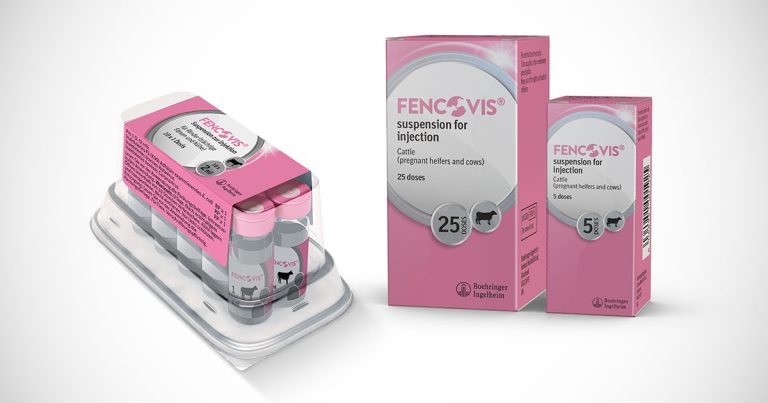2 Nov 2022
The vaccine is given to the dam up to 12 weeks before calving, and tests suggest it substantially reduces both cases and severity.

A new calf scour vaccine, which is the first licensed to prevent diarrhoea caused by both Escherichia coli and bovine rotavirus, has been unveiled by Boehringer Ingelheim.
Tests suggest the Fencovis jab also substantially reduces the severity of diarrhoea cases that are linked to bovine coronavirus.
The product, which is now available in the UK following its launch at BCVA Congress in Birmingham (in October), is intended to complement its existing Bovalto vaccine against bovine respiratory disease (BRD). But it will only be available on prescription as bosses believe the role of vets is critical to reducing disease levels and increasing industry sustainability as a result.
Brand manager Ailsa Milnes said: “We’ve been doing a lot of work around raising awareness (of calf health), and our message is to try to make the vet the centre and the focus for farm advice.
“It’s not going to be sold by the trade. We’ve made an absolute decision to do that so we’ve effectively cut ourselves off from some of that market. This is just through vets because we think vets are the communicators with farmers and will do the best job.”
Research has indicated calf scour is not only the leading cause of death in calves less than a month old, but also the most common disease observed in dairy herds, based on a German study of nearly 14,000 calves published last year.
Dr Milnes said current industry mortality figures were “pretty poor”, adding: “It’s so demoralising for farmers and for vets that work with them to see sick calves, so it is a big deal.”
The vaccine is administered to the dam as a single dose between three and 12 weeks before calving, and is intended to provide passive immunity to calves through the maternal colostrum.
Dr Milnes said: “That boosts her immunity and means there are antibodies going through the colostrum.
“It’s in that period when you’re expecting them to be ramping up their own immunity and having enough colostrum, enough antibodies in that colostrum and the next stage is to get that colostrum into the calf to give them that protection.”
Because calves do not have antibodies circulating when they are born, they are reliant on those absorbed through the colostrum for protection against disease in their first few hours of life.
The vaccine’s prevention claim is based on a study of 4 groups of 15 cattle in which 10 of each group were given the vaccine 11 or 12 weeks before calving, while 5 were left unvaccinated as controls.
The calves were all given colostrum from their dam for seven days, and exposed either to E coli at 12 hours old, rotavirus at seven days old, and coronavirus at seven or 14 days old respectively.
The study found that only 3 of the 40 vaccinated calves, all in the group exposed to coronavirus at 14 days old, developed mild diarrhoea.
Among the unvaccinated controls, three calves died and seven others were recorded as having severe diarrhoea.
Two deaths were recorded in the rotavirus group, with one among the E coli group. All 20 control calves developed some form of diarrhoea during the observation periods.
Dr Milnes added: “Anything we can do to make those calves as healthy as possible increases our productivity, efficiency and obviously sustainability, and a vaccine that is looking at prevention rather than treatment is a no-brainer. You want to stop the disease rather than allowing it to go through.”
Boehringer Ingelheim said it will also provide guidance to help vets maximise the impact of the vaccine on farms.
More information is available online.